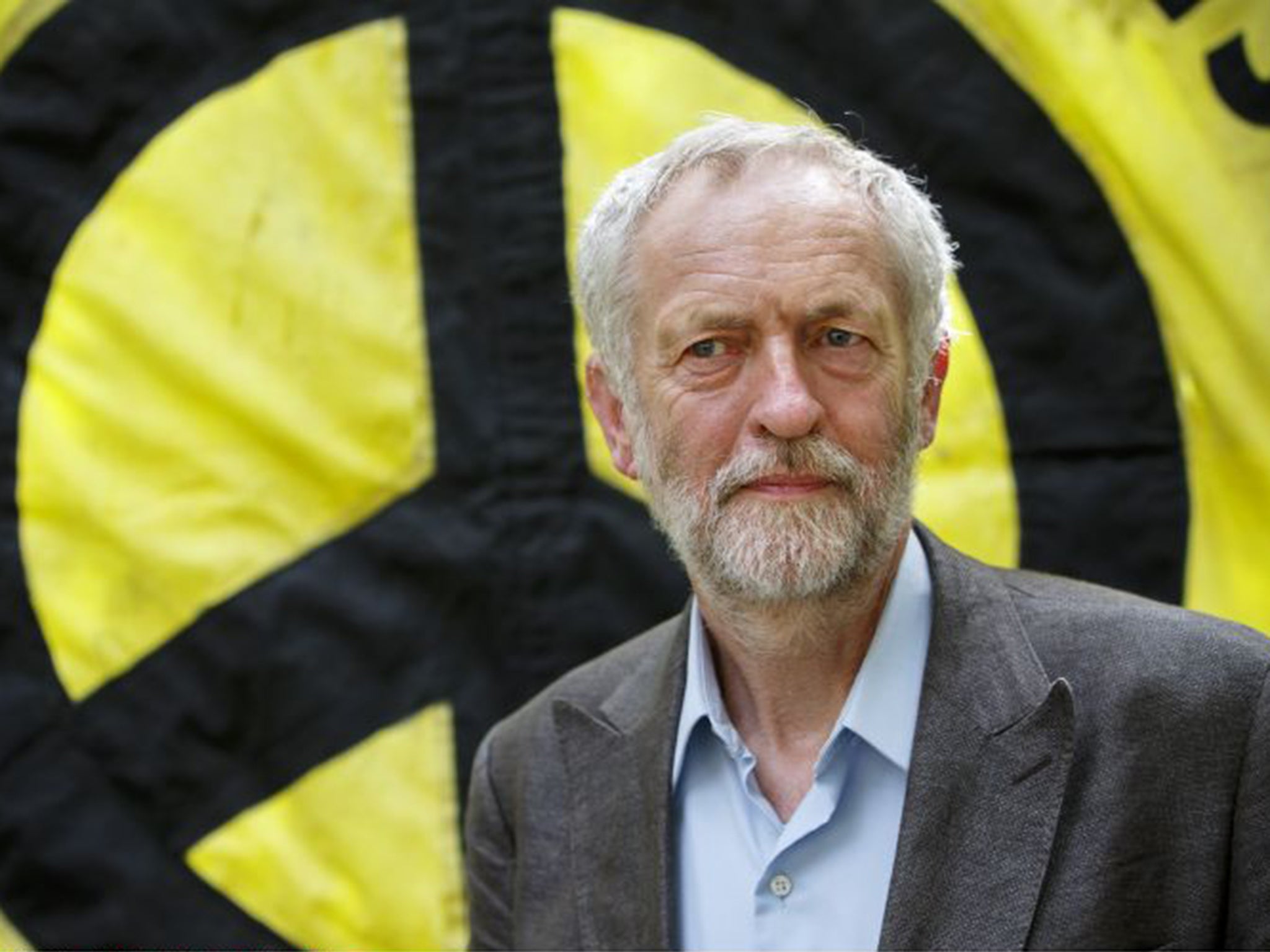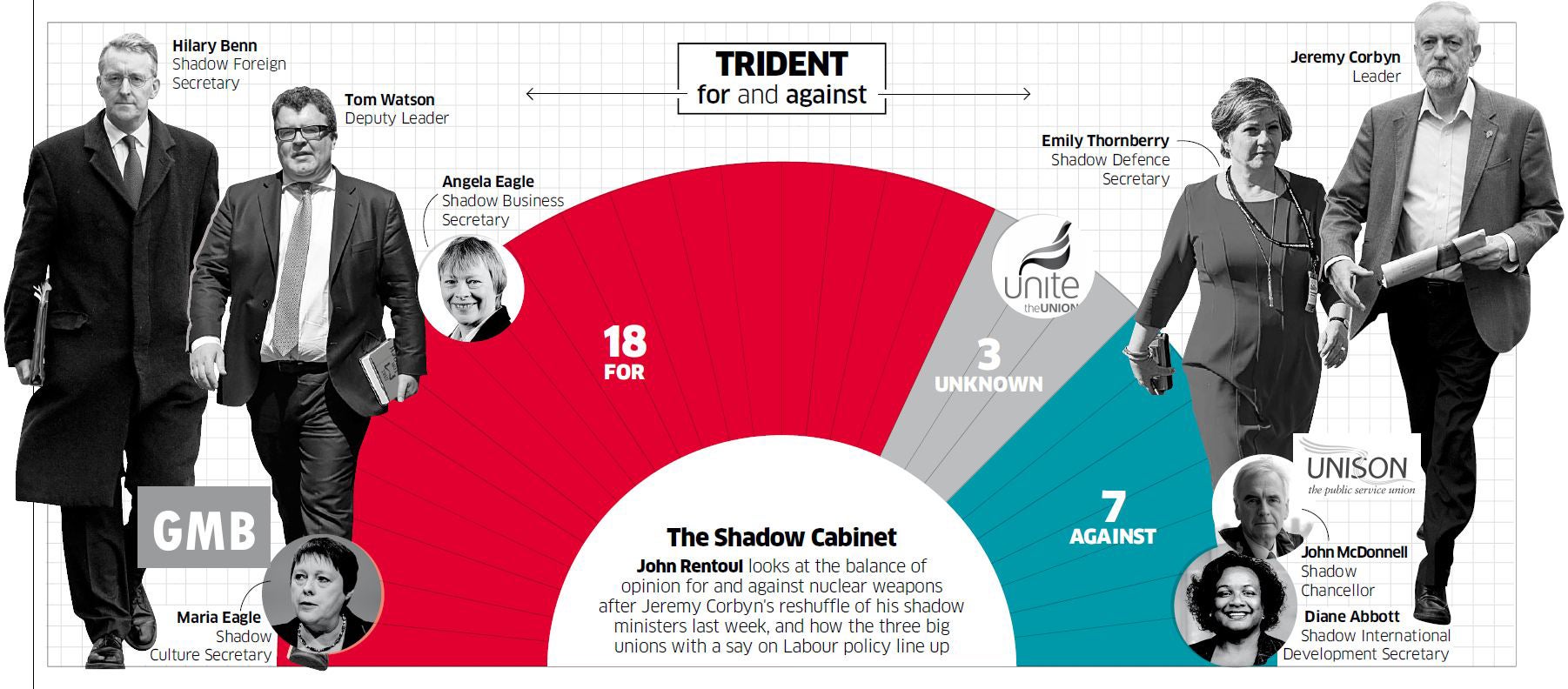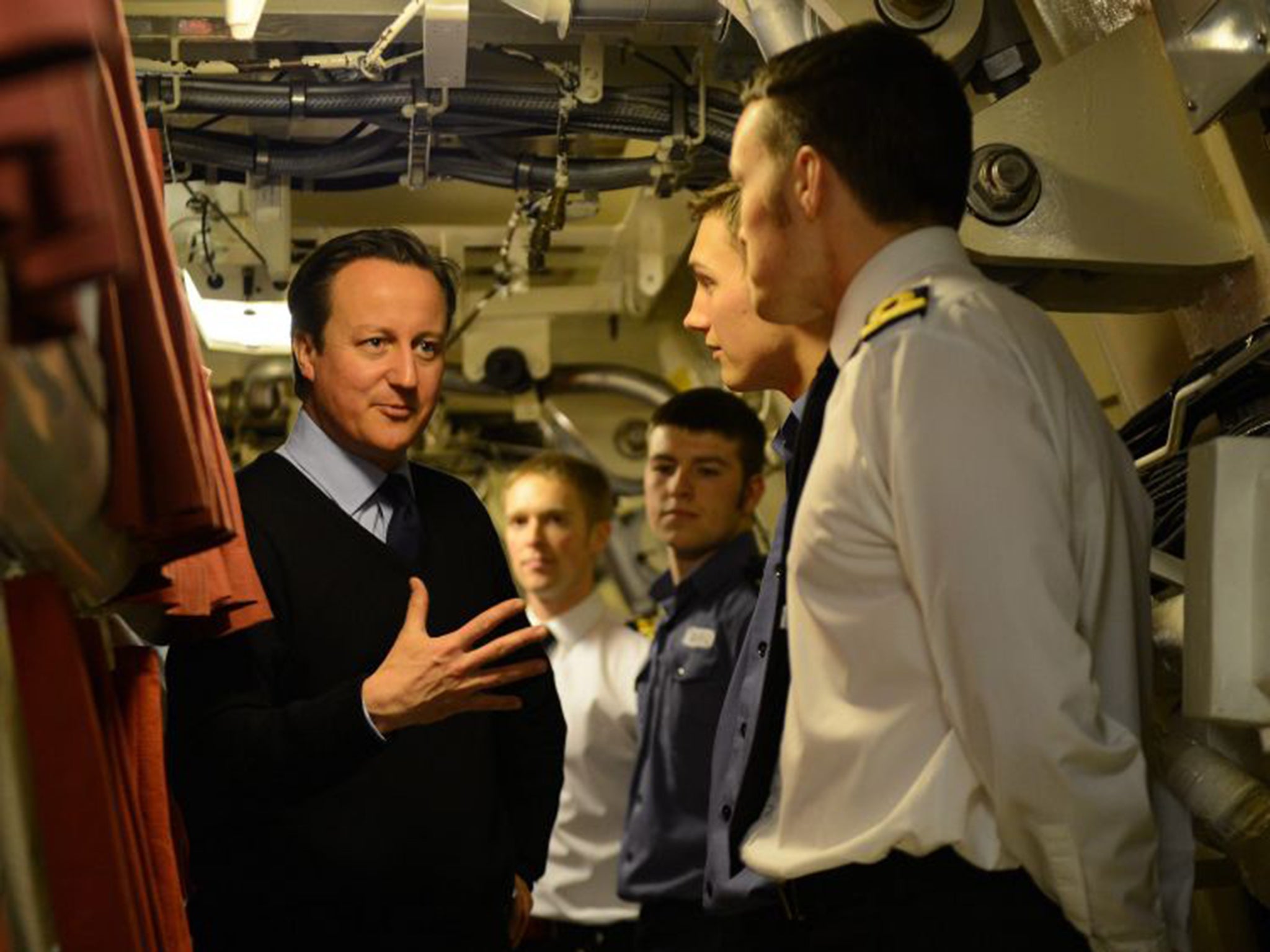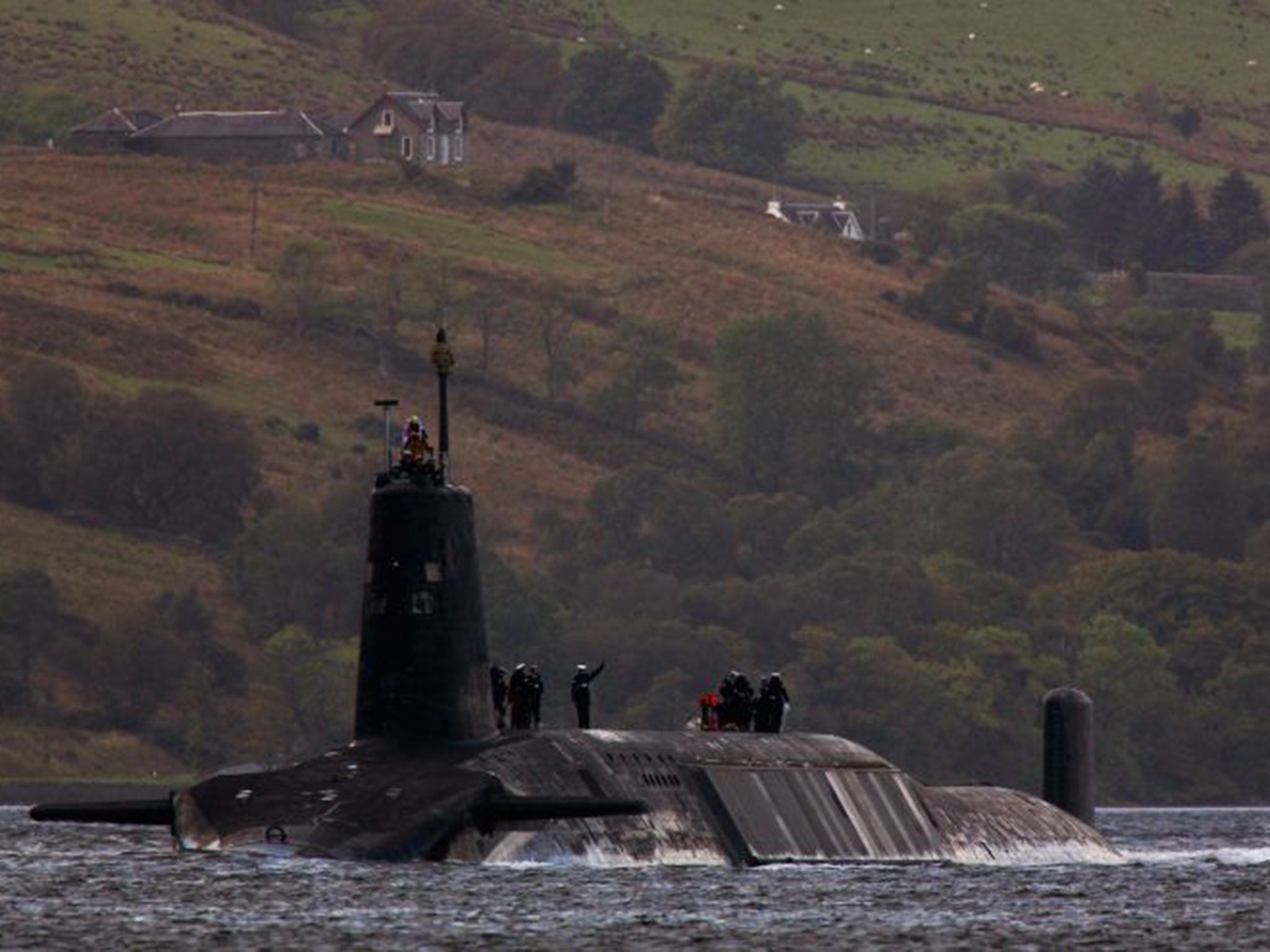Trident: Jeremy Corbyn hopes to alter Labour's stance on nuclear weapons by stripping shadow Cabinet of power
Exclusive: Leader wants Labour’s ruling body to be able to make policy decisions

Your support helps us to tell the story
From reproductive rights to climate change to Big Tech, The Independent is on the ground when the story is developing. Whether it's investigating the financials of Elon Musk's pro-Trump PAC or producing our latest documentary, 'The A Word', which shines a light on the American women fighting for reproductive rights, we know how important it is to parse out the facts from the messaging.
At such a critical moment in US history, we need reporters on the ground. Your donation allows us to keep sending journalists to speak to both sides of the story.
The Independent is trusted by Americans across the entire political spectrum. And unlike many other quality news outlets, we choose not to lock Americans out of our reporting and analysis with paywalls. We believe quality journalism should be available to everyone, paid for by those who can afford it.
Your support makes all the difference.Jeremy Corbyn’s secret blueprint to seize control of Labour’s policy-making machine to fast-track a change in the party’s position on Trident has been revealed in leaked documents drawn up by his allies in the trade unions.
Leading members of the Shadow Cabinet have been made aware of a paper which would strip them of the power to set policy between conferences. Instead, Labour’s National Executive Committee would explicitly be given the role of deciding policy.
One minister who has seen a copy of the proposal said that Mr Corbyn’s advisers were coordinating the move which would change the NEC’s “aims and objectives” to give it explicit power to set policy. The document is likely to be put before the NEC at its meeting this month.
Speaking to The Independent on Sunday, the shadow Chancellor John McDonnell said he had not seen the document but confirmed the NEC would decide “fairly quickly” on a process to change Labour’s position on Trident – and revealed it would happen “before the summer”.
He revealed that the review of the party’s nuclear policy, which is being conducted by former London Mayor Ken Livingstone and the new shadow Defence Secretary Emily Thornberry – would come up with a range of options, including unilateral disarmament, rather than recommending just one policy. One option, that is to be considered, is for Britain to become a “virtual nuclear state” like Japan and Iran – free of nuclear weapons but with the possibility of re-arming in a short period of time.

The options will then be put to Labour members, before the NEC decides the “process” for making a final decision. Mr Corbyn’s office want this all to be completed before the Government calls a Commons vote – which could come as early as March or April.
The revelation comes despite a warning from the Labour MP Dan Jarvis, who is tipped as a future leadership contender, that he may not stand at the next election if Mr Corbyn changes the party’s stance on Trident.
A spokesman for Mr Corbyn said the proposal to give sweeping new powers to the NEC would be “considered” once it was formally submitted. He added: “The NEC is having a consultation about its policy and role. Members of the NEC, including the unions, are submitting documents which will be brought together and considered.”
But a shadow cabinet minister who has seen the proposals said: “The leader’s office appears to have decided that the best way of changing the constitution of the party is to change the ‘aims and objectives’ of the NEC. They are putting a paper to the NEC with some changes to the ‘aims’ document.”
The proposed change says the NEC should be given all power over policy. “That is clearly with Trident in mind,” the shadow minister said. “It’s quite a clever way to get what they want. That’s to go back to the 1970s’ control over policy - it’s outrageous. It’s back to the future.”
The shadow minister added: “It’s being coordinated by the leader’s office. John McDonnell and Jeremy Corbyn say it’s the NEC which decides policy.

“I expect it will be put forward in January. Why would they be doing this otherwise?”
The draft document states that frontbenchers should be able to respond to the Government in the Commons – in effect making policy at short notice – but only if they have run it past the NEC and the leader’s office first.
Mr McDonnell, the shadow Chancellor, said: “The National Executive Committee will determine the mechanism for consulting the party members [and] then the mechanism for the final decision.
“The NEC, at the end of the day… is the final determinant of policy.”
Asked if a change of policy would happen before party conference in September – when policy changes are formally voted on – Mr McDonnell said: “It’s up to the NEC. The problem we’ve got is that the Government may bring forward a decision-making timetable which warrants a faster decision-making process by the party, so it will be up to the NEC to decide that.
“[The Government] is likely to do it before the summer, so it looks like the NEC will have to take that into account. They will have to timetable their process based on what is expected from Government.”
He confirmed there would be “a range of options” for Britain’s future nuclear system. “The NEC review will set out the options. Then there will be a consultation on that. The NEC will then determine the process by which the decision will be taken – that will be solely down to it. The NEC meets at the end of January. They are going to have to come up with a timetable quickly.”
Mr McDonnell said his position was “very straightforward... scrap the thing.”
A close ally of Mr Corbyn confirmed that the NEC could make changes so that decision-making would become more straightforward. The ally said: “If the NEC wants it and the party leader wants it, who is going to stop them? It’s a matter of political will.
“What it could do is change the way it operates to allow it to use its powers more efficiently and effectively.” The source added: “This is not a repeat of the unilateralist debate of the 1980s – it is whether the Government’s proposals are value for money.”
One friend of Mr Corbyn, who strongly supports the renewal of Trident, said there was no doubt Mr Corbyn would do all he could to change Labour’s policy. He said: “Jeremy would not be able to forgive himself if he passed up an opportunity to get Labour to vote against Trident.”

Who’s who on Labour’s NEC
* Jeremy Corbyn, Leader
* Tom Watson, Deputy Leader
* Diana Holland, Treasurer
* Three MPs nominated by the Shadow Cabinet: Angela Eagle, Jon Ashworth and Rebecca Long-Bailey.
* Glenis Willmott, leader of Labour MEPs
* Bex Bailey, Young Labour
* Twelve trade union representatives, one of whom, Paddy Lillis of Usdaw, is NEC chair
* Six Constituency Labour Party representatives, including Ken Livingstone
* Two Socialist Society representatives
* Two Labour Councillors
* Three Backbench MPs or MEPs elected by all Labour MPs and MEPs: Dennis Skinner, Steve Rotheram (Corbyn’s Parliamentary Private Secretary) and Margaret Beckett
Total 33
Corbyn has 11 firm supporters, but with some swing voters is close to a majority for opposing Trident.
Join our commenting forum
Join thought-provoking conversations, follow other Independent readers and see their replies
Comments